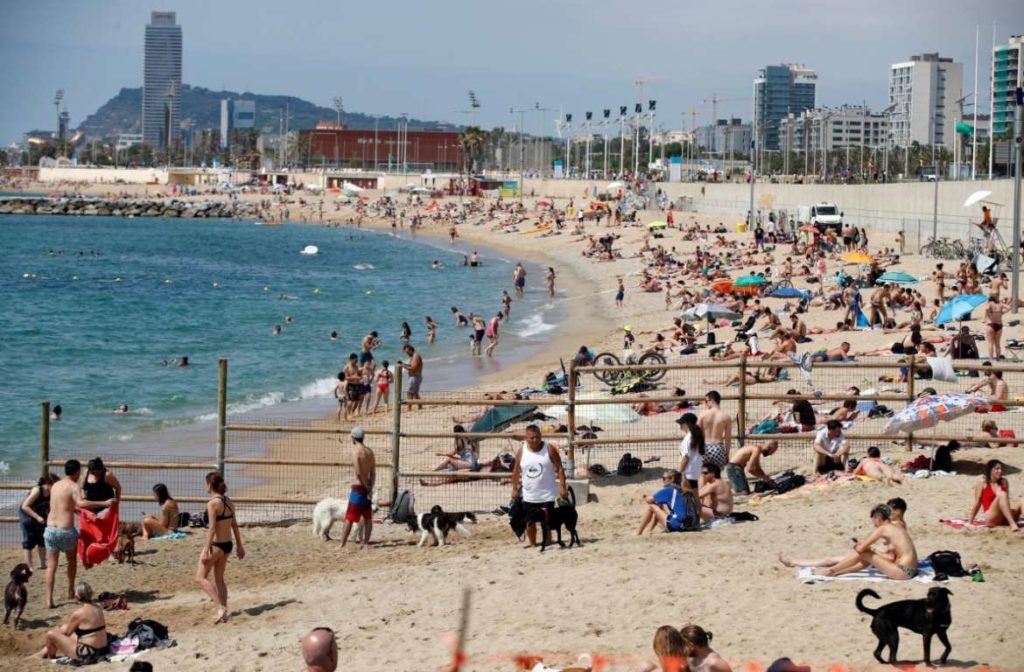Several countries in southern Europe popular with tourists, such as Spain, Portugal and Greece, have stated that they will reopen their borders to travellers who have been vaccinated or have tested negative for the coronavirus from May.
As the European "vaccination passport" is expected to be ready before the summer, a number of countries whose economy heavily relies on tourism are preparing to reopen.
On Tuesday evening, Greece's Tourism Minister Harry Theocharis announced that the country's borders would open to travellers from 14 May.
"Greece is ready with a full protocol for summer 2021," Theocharis said during a virtual speech for the ITB tourism exhibition in Berlin. "Tourists will be welcome if they are either vaccinated, have antibodies or test negative. All tourists will be able to be randomly tested on arrival."
Additionally, the Greek government is planning to vaccinate workers in the tourism industry as the next priority group, after the elderly and most vulnerable. One in five workers is employed in the tourism sector in Greece, and a second summer without tourism is not something the country can cope with, it said.
Related News
- Belgium won't link EU 'vaccination passports' to free travel, says Wilmès
- EU to present Covid-19 'vaccination passports' proposal in March
- Covid-19 vaccination passport 'possible before summer', EU leaders say
On Wednesday morning, Spain joined Greece when Spanish Tourism Minister Reyes Maroto said the country could start using the vaccination passport from May.
On 19 May, the big international tourism fair FITUR starts in Madrid, and according to Maroto, "that is when we can start implementing the digital passport," she said.
Portugal, too, is looking at May, the country's Tourism Minister Rita Marques told BBC last week, saying that even though its current roadmap to relax measures does not include any concrete dates, an exception may be made for tourism.
"Today, non-essential travel still has to be restricted, but we assume that Portugal will be able to allow unlimited travel again very soon," Marques said.
Later, she clarified that "very soon" could be as early as the beginning of May. "Everything will be ready to welcome tourists when their governments allow them to travel again," Marques added.
In contrast, France's Tourism Minister Jean-Baptiste Lemoyne remains a lot more cautious. On Wednesday morning, he stated that he wanted to invite the tourism sector to "work together on the conditions for a relaunch," but did not want to give a specific date.
He also talked about a "gradual easing" of measures for the hospitality industry, without being specific about what that means or when it could start.
"There are places where we know the transmission of the virus is lower - anything outdoors - and where the transmission is higher - anything indoors," Lemoyne said, adding that he remains opposed to a vaccination passport as a condition for travelling within the EU.
What exactly that European passport, the so-called "Digital Green Pass," will look like, is not yet clear, but earlier this month, European Commission President Ursula von der Leyen announced that a legislative proposal for it would be presented this month.
Political and scientific questions are currently being further clarified, according to her.
However, countries that are not as reliant on tourism, such as Belgium, are a lot more cautious about the vaccination passport, and are warning against discrimination between EU citizens.
As long as everyone has not had a fair chance of being vaccinated, no distinction should be made between those who have been vaccinated and those who have not, Prime Minister Alexander De Croo said at a European summit.
However, the EU has stressed that each Member State may decide for itself how the vaccination certificate will be used.
Maïthé Chini
The Brussels Times

